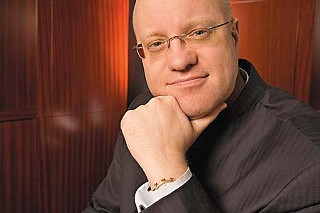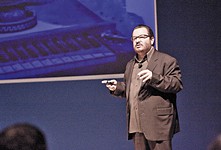When the New Thing Is Old News Already
Call it Murphy's nth Law of Computing: 'Any given program, when running, is obsolete'
By Richard Whittaker, Fri., March 4, 2011
If you bought an iPhone 4, you did so knowing that the iPhone 5 will likely be on sale before your current contract expires. That's what obsolete means to most people, and they are used to it: After all, it's only a phone or a laptop or a Blu-ray player. But what if that definition of "obsolete" is, well, obsolete? What if "obsolete" means that a whole way of thinking or doing – whole industries, even – are headed for the scrap heap?
Take personal checks: These good old-fashioned paper promises of payment have been around since possibly as early as the Roman Empire. Yet the clock is ticking toward their demise. Most Scandinavian countries have already abandoned them in favor of electronic transfers, while UK banks plan to dump them completely by 2018. To an outsider, the American dependence on checks – for wages, for shopping, for rent – is alien and antiquated. According to Brett King, author of Bank 2.0: How Customer Behavior and Technology Will Change the Future of Financial Services, it's about to become a thing of the past for Americans, too. Due to mobile technology, he said, "My daughter, I'm sure she'll never write a check in her life."
It will not be the debit or credit card that finally kills off checks. Instead, it could be near field communication. King explained: "I can say, 'I'm going to send you 50 dollars,' and I either put it in my phone or I get your e-mail address or I touch my phone to your phone. It's suddenly a whole lot easier." It's not new technology, nor is it untested. Payment by phone is common in Japan, and it's huge in Africa, where much of the population has bypassed desktop and laptop computers and gone straight to smart phones. Kenyan telephone company Safaricom only launched its phone-based banking network M-Pesa in 2007, but, King said, it already handles more money transfers in a month than Western Union does in a year. "The big four banks in Kenya that run most of the market, between them they have 3½ million customers," he said. "[M-Pesa] has 12 million."
Under this new banking paradigm, there's little difference between a prepaid, reloadable transit pass; a prepaid phone account; and a debit card. "They are functioning as a bank would," King said. "They're taking a deposit, and they are enabling payment." After centuries of operating basically unchanged, whole sections of the modern financial sector may find themselves outmoded due to out-of-industry technological innovations like online peer-to-peer lending. "[The concept] that banking can undergo a disruption of this scale is foreign to bankers."
It's not just the technology that banks need to worry about: It's the way technology allows people to behave and shapes their expectations. The data-rich, real-time, all-the-time online experience of a smart phone allows someone to check e-mail or check in for a flight. King said, "If your bank can't get your account balance to a mobile handheld screen, you'll think, 'C'mon, this is pretty basic stuff today.'" To make the jump from a physical presence, like checks and bank branches, to branchless, paperless banking will be tricky, not least because the retail bank executive in charge of branches is usually the person with the biggest budget. When the fight to truly embrace virtual business comes, King said, "[The retail bank executive is] going to fight that with his last dying breath, because the cash that he gets gives him the power in the organization."
The problem is that when firms are faced with the challenge to innovate or die, some die. Take the horse-drawn carriage industry in New York. In the 19th century, it was a major employer, with spin-off industries of hay sellers and dung collectors and horse-meat vendors. Then someone invented cars, and all horse-drawn carriages do now is carry tourists around Central Park. The smart people turned their stables into gas stations. The rest were left with empty stables.
The recent buzz has been about how brick-and-mortar video-rental chains like Blockbuster and Hollywood Video were crushed by Netflix. (Blockbuster's late-to-the-game attempt at home delivery and streaming trends were just that – late to the game.) Yet their demise is just market correction compared to what happened to the Encyclopaedia Britannica. After more than two centuries of publication and worldwide distribution, it seemed invulnerable, doing around half a billion dollars in sales annually in the early 1990s. Then in 1996 the company was sold for a reported (and piddling) $15 million. "How can that happen? It was Encarta," King said. Of course, by 2010 Microsoft's encyclopedia-killer was also gone, its CD-ROM format pushed into irrelevancy and insolvency by Wikipedia. King blamed that kind of obsolescence on "organizational inertia around 'This is the way we've always done this business,' and they just can't change quickly enough."
An obvious litany of content providers – software companies, music publishers, film studios, newspapers – has faced technology-based obsolescence with varying degrees of success. Yet Mike Masnick, founder of Techdirt, sees the same wave bearing down on almost every industry, from pharmaceuticals to manufacturing. It's not that the technology itself has changed; rather, it has changed underlying ideas. Economics has always been about what Masnick called "the study of scarcity." Now that people no longer depend on brick-and-mortar banks that are only open 40 hours a week or a record store that's closed on Sundays, the economics are increasingly about abundance. "That's the thing that has been most difficult for most people who are used only to dealing with scarcity," he said.
Masnick called the entertainment industry's battle over copyright and patents "an early warning system" for other industries. Since modern copyright law began in 1709, it has become a backbone of commerce because of one key idea: that people will stop innovating if their ideas are not legally protected. "There's certainly questions to whether that's true," Masnick said. "But copyright law as it stands today is based on the premise that it's true of all content." As the music industry has found to its great detriment, dragging copyright violators and illegal downloaders through the courts has not protected its profits or killed off pirate sites. Instead, Masnick said, "As the laws fight more and more what people want to do, people respect the laws less and less."
So banking is changing forever, and you can't even trust the idea of copyright: How can anyone escape becoming obsolete?
Well, that depends on how you define "obsolete." William Charnock, chief strategy officer of digital advertising agency R/GA, called that "the question of the age." Obsolescence, as Blockbuster proved, can strike almost instantaneously, and firms are starting to realize that technology is not the tool of their downfall, but the reason for it. He said, "Digital has changed the nature of what it means to be successful, how you manage success, how you think about success, and how you get there." In the past, he added, "brands managed their success essentially by buying the distribution and blocking others out. ... Now they have to earn their success."
It's that dreaded paradigm shift again. For centuries, the definition of success has been about flat-out market domination, and obsolescence was warded off by building a commercial bulwark. Now success is about maintaining customer interest. The big danger for firms is to flail from one big product launch to another, confusing a new serial number with true innovation. Andrea Ring, R/GA's planning director, described that as counterproductive. True innovation, she said, is about "really figuring out who you're engaging with and what's interesting to those people."
Charnock and Ring say their more successful clients get that: When R/GA first started, what companies wanted from a digital marketing firm was a cool website and online marketing tactics. Now they want strategies to deal with digital natives. For Charnock, that means they're grasping that the only way to avoid obsolescence is to keep moving. He said, "The point at which a brand is at its most successful, when it has its big critical mass, is the point when people have to innovate the most."
Related Panels
Banks: Innovate or Die!
Saturday, March 12, 11am, Hilton Salon F/G
What Would Copyright Look Like If Created Today?
Sunday, March 13, 12:30pm, Hilton Salon C
Congratulations! Your Brand Is About To Become Obsolete
Sunday, March 13, 11am, ACC Ballroom F













